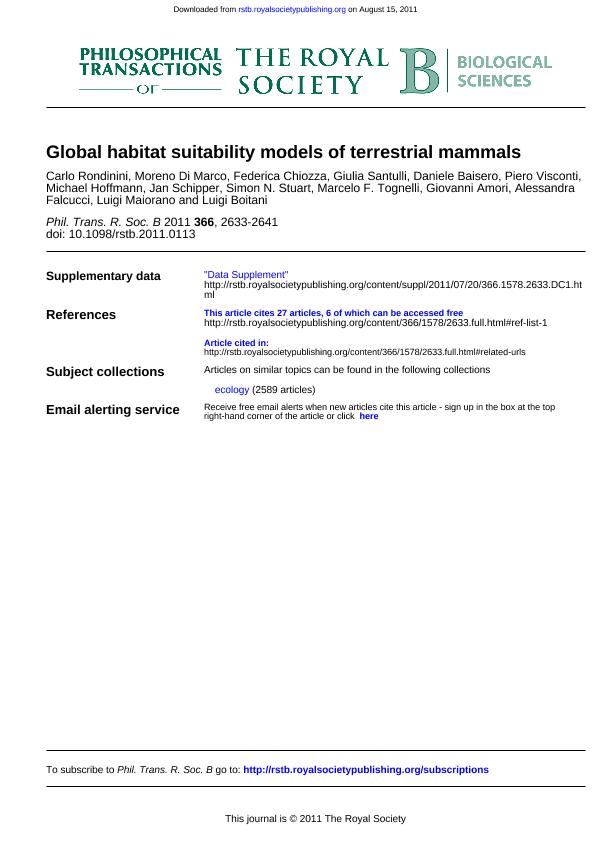Mostrar el registro sencillo del ítem
dc.contributor.author
Rondini, Carlo
dc.contributor.author
Di Marco, Moreno
dc.contributor.author
Chiozza, Federica
dc.contributor.author
Santulli, Giulia
dc.contributor.author
Baisero, Daniele
dc.contributor.author
Visconti, Piero
dc.contributor.author
Hoffmann, Michael
dc.contributor.author
Schipper, Jan
dc.contributor.author
Stuart, Simon N.
dc.contributor.author
Tognelli, Marcelo Fabio

dc.contributor.author
Amori, Giovanni
dc.contributor.author
Falcucci, Alessandra
dc.contributor.author
Maiorano, Luigi
dc.contributor.author
Boitani, Luigi
dc.date.available
2018-08-16T19:51:45Z
dc.date.issued
2011-09
dc.identifier.citation
Rondini, Carlo; Di Marco, Moreno; Chiozza, Federica; Santulli, Giulia; Baisero, Daniele; et al.; Global habitat suitability models of terrestrial mammals; The Royal Society; Philosophical Transactions of the Royal Society B: Biological Sciences; 366; 1578; 9-2011; 2633-2641
dc.identifier.issn
0962-8436
dc.identifier.uri
http://hdl.handle.net/11336/56008
dc.description.abstract
Detailed large-scale information on mammal distribution has often been lacking, hindering conservation efforts. We used the information from the 2009 IUCN Red List of Threatened Species as a baseline for developing habitat suitability models for 5027 out of 5330 known terrestrial mammal species, based on their habitat relationships. We focused on the following environmental variables: land cover, elevation and hydrological features. Models were developed at 300 m resolution and limited to within species' known geographical ranges. A subset of the models was validated using points of known species occurrence. We conducted a global, fine-scale analysis of patterns of species richness. The richness of mammal species estimated by the overlap of their suitable habitat is on average one-third less than that estimated by the overlap of their geographical ranges. The highest absolute difference is found in tropical and subtropical regions in South America, Africa and Southeast Asia that are not covered by dense forest. The proportion of suitable habitat within mammal geographical ranges correlates with the IUCN Red List category to which they have been assigned, decreasing monotonically from Least Concern to Endangered. These results demonstrate the importance of fine-resolution distribution data for the development of global conservation strategies for mammals.
dc.format
application/pdf
dc.language.iso
eng
dc.publisher
The Royal Society

dc.rights
info:eu-repo/semantics/openAccess
dc.rights.uri
https://creativecommons.org/licenses/by-nc-sa/2.5/ar/
dc.subject
Conservation Priority Setting
dc.subject
Geographical Range
dc.subject
Range Model
dc.subject
Red List
dc.subject
Species Distribution Model
dc.subject
Species Richness
dc.subject.classification
Otras Ciencias Biológicas

dc.subject.classification
Ciencias Biológicas

dc.subject.classification
CIENCIAS NATURALES Y EXACTAS

dc.title
Global habitat suitability models of terrestrial mammals
dc.type
info:eu-repo/semantics/article
dc.type
info:ar-repo/semantics/artículo
dc.type
info:eu-repo/semantics/publishedVersion
dc.date.updated
2018-07-11T14:36:37Z
dc.journal.volume
366
dc.journal.number
1578
dc.journal.pagination
2633-2641
dc.journal.pais
Reino Unido

dc.journal.ciudad
Londres
dc.description.fil
Fil: Rondini, Carlo. Sapienza Universita di Roma. Department of Biology and Biotechnologies; Italia
dc.description.fil
Fil: Di Marco, Moreno. Sapienza Universita di Roma. Department of Biology and Biotechnologies; Italia
dc.description.fil
Fil: Chiozza, Federica. Sapienza Universita di Roma. Department of Biology and Biotechnologies; Italia
dc.description.fil
Fil: Santulli, Giulia. Sapienza Universita di Roma. Department of Biology and Biotechnologies; Italia
dc.description.fil
Fil: Baisero, Daniele. Sapienza Universita di Roma. Department of Biology and Biotechnologies; Italia
dc.description.fil
Fil: Visconti, Piero. Sapienza Universita di Roma. Department of Biology and Biotechnologies; Italia. James Cook University; Australia
dc.description.fil
Fil: Hoffmann, Michael. United Nations Environment Programme World Conservation Monitoring Centre; Reino Unido. International Union for Conservation of Nature; Suiza. Conservation International; Estados Unidos
dc.description.fil
Fil: Schipper, Jan. Big Island Invasive Species Committee; Estados Unidos
dc.description.fil
Fil: Stuart, Simon N.. International Union for Conservation of Nature; Suiza. United Nations Environment Programme World Conservation Monitoring Centre; Reino Unido
dc.description.fil
Fil: Tognelli, Marcelo Fabio. Conservation International; Estados Unidos. Consejo Nacional de Investigaciones Científicas y Técnicas. Centro Científico Tecnológico Conicet - Mendoza. Instituto Argentino de Investigaciones de las Zonas Áridas. Provincia de Mendoza. Instituto Argentino de Investigaciones de las Zonas Áridas. Universidad Nacional de Cuyo. Instituto Argentino de Investigaciones de las Zonas Áridas; Argentina
dc.description.fil
Fil: Amori, Giovanni. Institute for Ecosystem Studies; Italia
dc.description.fil
Fil: Falcucci, Alessandra. Sapienza Universita di Roma. Department of Biology and Biotechnologies; Italia
dc.description.fil
Fil: Maiorano, Luigi. Sapienza Universita di Roma. Department of Biology and Biotechnologies; Italia. University of Lausanne. Department of Ecology and Evolution; Suiza
dc.description.fil
Fil: Boitani, Luigi. Sapienza Universita di Roma. Department of Biology and Biotechnologies; Italia
dc.journal.title
Philosophical Transactions of the Royal Society B: Biological Sciences

dc.relation.alternativeid
info:eu-repo/semantics/altIdentifier/url/http://rstb.royalsocietypublishing.org/content/366/1578/2633
dc.relation.alternativeid
info:eu-repo/semantics/altIdentifier/doi/http://dx.doi.org/10.1098/rstb.2011.0113
Archivos asociados
